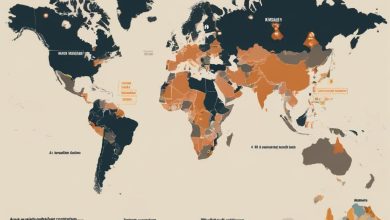The Positive Impact of Human Migration on Host Countries

Introduction
Human migration, the movement of people from one place to another, has been a fundamental aspect of human history. With globalization and increased connectivity, migration today plays a significant role in shaping the economies, cultures, and demographics of nations.
Economic Growth and Workforce Development
One of the most significant benefits of human migration is economic growth. Migrants contribute to the labor force, filling critical gaps in various sectors, including healthcare, technology, and agriculture. They bring diverse skills and perspectives, fostering innovation and entrepreneurship. In many developed countries, aging populations create a demand for young, skilled workers—a gap that migrants often fill.
Migrants also contribute to the economy through taxes and social security payments. Studies have shown that migrants often pay more into the system than they take out in benefits. This is particularly beneficial for maintaining public services and pension systems in countries with declining birth rates.
Cultural Enrichment and Innovation
Migrants bring with them a wealth of cultural diversity that enriches society. This diversity fosters creativity and innovation, as different perspectives lead to new ideas and solutions. Cultural exchange can enhance arts, cuisine, and educational systems, making societies more vibrant and dynamic.
Moreover, diverse workplaces lead to improved problem-solving and creativity in businesses. Companies that embrace diversity are often more competitive and able to adapt to changing markets.
Demographic Balance
Many developed countries face demographic challenges due to low birth rates and an aging population. Migration can help balance the demographic scale by bringing in younger individuals who can support the economy and care for the aging population. This demographic infusion ensures a sustainable workforce and helps prevent potential declines in economic productivity.
Strengthening International Relations Migration can strengthen diplomatic and economic ties between nations. Migrant communities often maintain cultural and economic connections with their countries of origin, facilitating trade and bilateral cooperation. These diasporas can act as bridges, enhancing mutual understanding and collaboration on global issues.
Challenges and Considerations
While there are numerous benefits, migration also presents challenges that need to be managed carefully. Integrating migrants into society, ensuring access to services, and addressing potential social tensions are critical for maximizing the benefits of migration.
Policies should focus on promoting social cohesion and ensuring that migrants have opportunities to contribute economically and culturally. Successful integration requires collaboration between governments, civil society, and migrants themselves.
Conclusion
Human migration, when well-managed, offers substantial benefits to host countries. From economic growth and cultural enrichment to demographic balance and strengthened international relations, migrants play a crucial role in driving progress. By embracing migration and investing in integration, countries can harness its full potential, creating more prosperous and dynamic societies for all.




